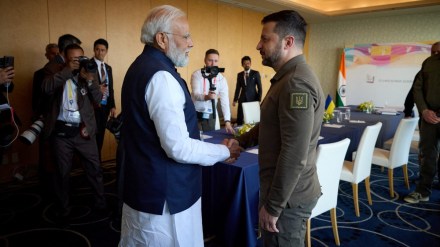Prime Minister Narendra Modi‘s upcoming visit to Ukraine (August 23, 2024) marks a critical juncture in India’s diplomatic efforts amid the ongoing conflict between Ukraine and Russia. As the war continues to affect global politics and economics, Modi’s visit underscores India’s commitment to playing a more active role in seeking peaceful resolutions and maintaining its strategic interests.
Agenda Announced by MEA
In a special briefing ahead of the visit, Secretary (West) Tanmaya Lal, Ministry of External Affairs said the PM will be visiting Ukraine on Aug 23, 2024 at the invitation of President of Ukraine, Volodymyr Zelenskyy.
“This also is a landmark and historic visit since this will be the first time that an Indian Prime Minister will be visiting Ukraine in more than 30 years, since the diplomatic relations were established between our countries,” Lal added.
According to him, this visit will build upon the recent high-level interactions between the two leaders. As reported previously Prime Minister Modi and President Zelenskyy had met only a couple of months ago in June this year in Apulia at the sidelines of the G7 Summit. They had also met last year in Hiroshima on the margins of the G7 Summit. They had earlier met in Glasgow on the sidelines of COP in 2021.
Importance of the Visit
India’s relationship with Ukraine has historically been multifaceted, encompassing trade, education, and cultural exchanges. However, the ongoing conflict has disrupted these ties, necessitating a renewed engagement at the highest level. Modi’s visit to Ukraine is not just about reaffirming support for Ukraine’s sovereignty but also about positioning India as a neutral party capable of fostering dialogue between conflicting sides.
The visit is crucial for several reasons. Firstly, it signals India’s intent to maintain a balanced foreign policy approach, despite its close ties with Russia. This balancing act is essential for India to sustain its relationships with both the West and Russia while advocating for peace. Secondly, it allows India to address concerns related to global food security, given Ukraine’s significant role as a grain exporter. The disruption in supplies due to the conflict has had far-reaching effects, and India’s engagement could contribute to stabilizing food supplies.
Moreover, India’s involvement in global issues like the Ukraine conflict enhances its image as a responsible global player. By engaging with Ukraine, India is demonstrating its commitment to upholding international law and order, which resonates with its broader foreign policy objectives.
India’s Position on the Conflict
India has maintained a consistent stance on the Ukraine-Russia conflict, underlining the need for dialogue and diplomacy to resolve differences. During various international forums, India has refrained from taking sides, instead urging both parties to come to the negotiation table. This neutral stance has allowed India to maintain its strategic autonomy, enabling it to engage with both Ukraine and Russia.
In this context, Modi’s visit is seen as a continuation of India’s efforts to promote peace. By directly engaging with Ukrainian leadership, Modi is reinforcing India’s message that the conflict’s resolution lies in diplomacy, not warfare. This approach aligns with India’s long-standing foreign policy principles, which prioritize non-alignment and peaceful coexistence.
Special Briefing
In the lead-up to Modi’s visit, Tanmaya Lal, Secretary West, Ministry of External Affairs, remarked on the importance of this engagement, stating, “India’s position on the Ukraine conflict is rooted in our belief that all disputes must be resolved through dialogue and respect for international law. Prime Minister Modi’s visit to Ukraine is a reaffirmation of our commitment to these principles.”
Lal also highlighted India’s concern over the humanitarian impact of the conflict, particularly the plight of civilians caught in the crossfire. “India stands for peace and supports all efforts to alleviate the suffering of the people of Ukraine. The Prime Minister’s visit will focus on promoting initiatives that contribute to the well-being of those affected by the conflict,” he added.
The visit is also expected to include discussions on securing stable supply chains for essential commodities, an area where India has significant stakes. As one of the world’s largest grain consumers, India has been directly impacted by the disruptions in Ukrainian exports. Modi’s visit may lead to agreements that could help stabilize these supply chains, ensuring food security not just for India but for other vulnerable nations as well.
Bottomline
Prime Minister Modi’s visit to Ukraine is more than just a diplomatic engagement; it is a strategic move that underscores India’s role as a global peacemaker. By advocating for dialogue and working to stabilize essential supply chains, India is positioning itself as a crucial player in the resolution of the Ukraine conflict. This visit is a clear indication that India is ready to take on greater responsibilities on the global stage, using its influence to promote peace and stability in a volatile world.
